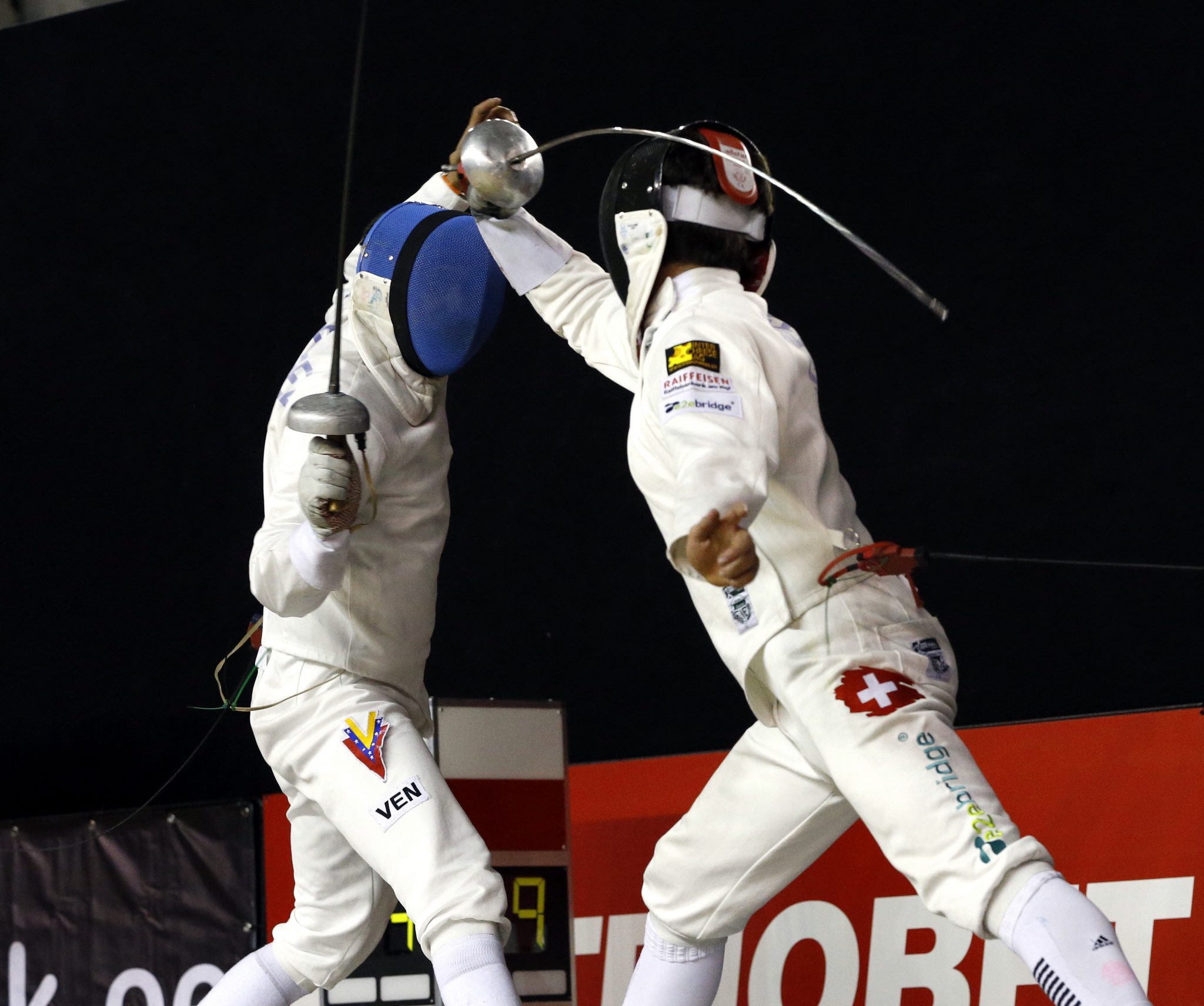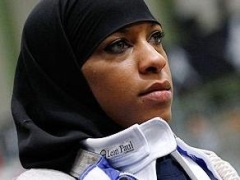Here is the latest interview from the Tianjin China Women’s Sabre Grand Prix. Serge Timacheff speaks with 2004 Olympic Gold Medalist Mariel Zagunis about the rigors of the world cup season and team strategy for fencing their team matches.
Interview Transcript:
Interviewer: So Mariel Zagunis, how has the season been so far?
Mariel Zagunis: My season has been all right. I wish it could be a little bit better, but _____ _____ (Static) I’ve had a few finals and I’ve won two World Cups, so it’s going well.
Interviewer: Tell us a little about the process of the preparations for qualifying for St. Petersburg and then beyond that. What’s involved in qualifying for the Olympic Games for you?
Mariel Zagunis: Well, I started taking time off of school starting last semester, so ever since December, I’ve been in Portland training with Ed at my club. I’ve been fencing all the time, really hard, and doing some class training on the side. It’s kind of hard at the peak of the season when you’re traveling for two weeks on and one week off to really get in tip-top shape. But pre-St. Petersburg, I’m going to keep working on my tactical game and my physical shape and hopefully be ready.
Interviewer: So what’s involved in working on your tactical game? Give us some details?
Mariel Zagunis: Watching a lot of videos. I have a lot of videos of my fencing from these past tournaments where I haven’t performed tactically the way that I’ve wanted to and so Ed and I will sit down and definitely review those tapes over and over and over until I get it drilled into my mind what I did wrong and how I can change.
Interviewer: Well, maybe even a little more specific about the tactical side of things. So give us an example of some specific instance that maybe sticks out in your mind that you’ve reviewed and practiced then.
Mariel Zagunis: Well, I know we’ve been dealing a lot with the Chinese because they have kind of figured us out as individuals and as a team. So we just need to, well, I’ll speak for myself, need to work on my attacks a lot more because I’ve matured a lot and I’m also been just fencing really fast and being too excited about things when I just need to slow down and concentrate more.
Interviewer: Looking back to Athens, almost four years ago now, but I guess three years ago, tell us how you’ve changed as an athlete and how your perspective of competition has changed since then.
Mariel Zagunis: What was the first part of the question again?
Interviewer: Well, give us your perspective of just how you’ve changed since then and –
Mariel Zagunis: Well, I think the new timing changed a lot of the way that people go into a bout. And especially now with the video review, that really also breaks up the rhythm of the bout. You can get some more time to think about things and slow down again. So the video review makes a huge difference, and also the timing. But I think a lot of people adjusted to the timing pretty quickly. But for me, I am not quite at the same level that I was about three years ago. I would say that I’ve dropped down a little bit. But at the same time, my results have always – have been consistently better than they were pre-Athens, which has been nice.
But then again, my coach said that we’re getting spoiled with these results because I made a final – a top eight in this tournament and I was really upset, but my coach is like, “It’s the top eight in the Grand Prix. That’s still a really good result.” So it’s important for me to keep that in mind as I go through the season.
Interviewer: What about psychologically? You’ve sort of touched on that a little bit with the kind of top eight factor. But do you actually do anything to train psychologically? Do you do anything to think about how you respond to wins and losses and then how you go on to subsequent bouts?
Mariel Zagunis: Well, fencing, as most people know, is more mental than it is physical when it comes down to it. So along with training your body, you need to also train your mind and that’s – I’m taking a lot of time to do that this season. I’m going to take a lot more time in the future to, like I said, go over videos and just slow down a lot with everything, not worry so much about the physical fighting part of it, but more ot he mental fighting of the bout.
Interviewer: What would you say overall, just in general, what are your biggest challenges?
Mariel Zagunis: My biggest challenges are – right now, I just get too excited. I just want to win everything fast all the time and don’t slow down to think about it. So that’s one thing that I’m going to start working on. There’s a few fencers out there who I think that I personally, and we as a team, kind of have a mental block against. So the next two tournaments are gonna be important to overcome.
Interviewer: Obviously, there’s a big difference between individual and them team competition. So tell us a little bit about what’s going on from the team side of things in terms of zonal qualifications and things like that.
Mariel Zagunis: Well, I think right now we’re looking at us making the top four. When it comes to the World Championship, obviously, there’s still one more Grand Prix and then the other zones have their zonal qualifiers.
So we don’t really know what it’s gonna be like going into St. Petersburg, but I think to qualify for Beijing, we’re looking to be in the top four and not have to go through the zonal qualifiers. But if we do, we still have a much stronger team; I would have to say, than Canada or Venezuela or Cuba. So those would be our main competitors and I think we’ll be okay. But you never know what can happen. We have a very strong team, really good girls, smart fencers, so I’m opting to stick.
Interviewer: I understand that you’ve recently gotten a sponsor. Can you talk about that? Oh, okay. All right. I can just put that out.
Mariel Zagunis: Okay.
Interviewer: Okay.
Mariel Zagunis: _____ anyway. Maybe we can talk about another _____.
Interviewer: Okay. That’s fine. _____. Let me shift gears here. Oh, I know what I wanted to ask you. I’ve seen some different ways that the U.S. team approaches how it puts players on the strip and who it puts into the game. There are a couple people that are always in. But how does that work?
Mariel Zagunis: Well, we do it by point standings on the national point standings.
Interviewer: But I mean if you have, say –
Mariel Zagunis: _____ four people and then we go –
Interviewer: Right.
Mariel Zagunis: Oh, well, I mean, it just depends on who’s having their day and who’s not. That’s why the fourth person is so important, because even though they are technically alternates, when they are put in, are replacing the first, second, or third fencer already. So they usually are, but also have to perform as good as the people who they’re on the team with. And so I think the fourth place person plays a very important role and it’s important to make sure that they’re ready and they can be put in or put or – it all just depends on who’s fencing the best that day.
Interviewer: How is it when you travel all the time and fence people from other countries and then all of a sudden after this big chore of all these Grand Prix and World Cups, you come back and fence Nationals, what’s that like?
Mariel Zagunis: Well, my last national competition was in January, which is before all these Grand Prixes and everything. So it’s definitely a different feel that we have going on in the national competitions. I would say a lot more relaxed, a lot less stressful for me because you’re close to your own time zone at least and among a lot more of your friends. We have a good group that travels together, but the last couple of national tournaments that I’ve been to have just really been fun among the competition.
Interviewer: Okay. Well, thank you very much.
Mariel Zagunis: All right. Thank you.
[End of Audio]





